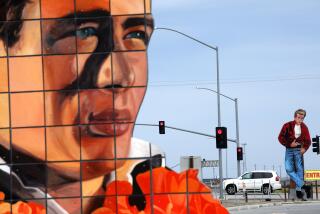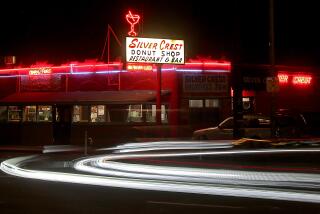A big fish in a small desert pond
The Budweiser truck is there waiting when Yousuf Khawaldeh pulls up in his beat-up ’94 Lexus.
FOR THE RECORD:
In an earlier version of this article, Yousuf Khawaldeh’s name was misspelled as Yousouf Kwaldeh.
It’s huge, that truck. It hides Khawaldeh’s store and the abandoned wooden building next door, a onetime brothel.
Khawaldeh — Joe, to his customers — opens the door for the deliveryman. Pallet after pallet of cans come off the back, enough to quench the thirst of this entire desert town. Joe doesn’t touch the stuff, but his customers buy 15 to 20 cases a day.
Beer, cigarettes, energy drinks and lottery tickets. They’re the lifeblood of this tiny store that has been here for 130 years. It’s managed to survive a fire, a population exodus and the loss of business after Interstate 40 was built and fewer motorists passed by the store on old Route 66.
To the people of Daggett, the store is part of their daily routine. They come to gossip, pay their utility bills or stock up on soda. To Joe, the market is a steppingstone to a better life.
The 43-year-old Jordanian immigrant at times spends 12 hours a day, seven days a week in the Desert Market, which is painted a faded turquoise, trying to earn enough money so that he doesn’t have to come here anymore. He has saved enough to buy an off-road vehicle, take a day or two of vacation once in a while, pay someone else to stand behind the register now and then.
That’s what he loves about Daggett, about the United States.
“If you are determined and you want to do something, you can,” he says. “Trust me.”
Daggett, population 200, is surrounded by desert, sage and dust; purple mountains and lumpy hills stretch into the distance. For most people, this place is little more than a blip on the map, halfway between Los Angeles and Needles.
The Desert Market is the only store for miles. Nearby, there’s a trailer park, a junkyard and a truck repair shop — and not much else. The gas station is long since boarded up, and a dozen silent houses sag into piles of wood and metal.
It’s peaceful in the mornings. The only sounds are the humming of the refrigerators and the occasional rumbling of freight trains.
The first customer of the day walks through the door. It’s Danna O’Brien, who always stops by on the way to her waitress job at the Desert Springs Bar-N-Grill, wearing a hairnet and a bandanna tied across her forehead.
“Hey honey,” she says with a drawl. She has come in to buy an apple juice — her fruit for the day, she jokes. Later, after her shift, she’ll come back showered and smiling, her husband on her arm, to buy some candy. Joe is like family, she says, and she wants to support any business in the town, which she fondly calls “Dag-ghetto.”
Next comes housewife Deena Franklin, a slight woman with glasses who buys a can of soda.
“I sit at home, on my computer all day, and watch soap operas,” she says. “Story of my life.”
“‘Days of Our Lives,’” Joe interjects. “Good show.”
“Shut up, Joseph,” she says with a grin on her face.
Mike Francis, who is on vacation from his job at the solar power plant down the road, sits on the window sill for hours, glancing at his red Mustang parked outside, nagging Joe to take cigarette breaks.
Those are the easy customers. There are the tiresome ones, like the people who ramble on about their children, their parents, the government, using Joe to ease their loneliness.
During one customer’s rant about the country’s impending demise, Joe subtly reaches into his pocket, where he keeps his cellphone, and calls the store’s number. The ringing that follows gives him as good an excuse as any to break up the conversation.
Days in the Desert Market are punctuated by peaks and valleys. Half an hour could go by without a soul, then a dozen customers will come in at once and become irritated at the line. They’ll wander off to look for more things to buy, through the five aisles of canned food, lighters, packaged donuts, toward a corner where Joe sells household goods and a pair of used Rollerblades labeled with a yellow Post-it note that says, “For sale. Make me an offer today.”
Joe greets each customer with “Hey man,” or “How are you?” Even the ones who yell from the aisles, asking where to find the toilet paper.
“Am I blind or are you out of butter?” one man shouts frantically from the fridges that line the left side of the store.
“I hear you sell stamps here,” says another, striding to the counter like a man who has better things to do than loiter in the desert.
Some customers Joe must shoo away. When a woman comes in to buy milk, he refuses her because her family has fallen behind on paying off its credit. Later, she sends her son.
“No, your limit is up,” he tells the boy, who looks about 9. The boy scurries away, embarrassed.
Joe glances at the picture above his head, a drawing of the store as it was in the 1890s, before it burned down in a 1908 fire and was rebuilt in its current form. He has to remain firm, just as storekeepers did in this silver-mining town whose past has been described as a “lurid and barbarous hotbed of vice.”
“I used to be nicer,” Joe says. “But it takes a while to recover from that, if they don’t pay their bills.”
Joe could have been a fighter pilot. He passed the aviator’s exam for the Royal Jordanian Air Force, he says, but also applied to schools in the U.S. on a lark. The University of Washington accepted him into a master’s degree program in sociology in 1989, and he was gone.
The cold weather in Washington drove him to UC Riverside, where he studied and worked long hours at other people’s stores to make ends meet.
His life was a blur of early shifts at Winchell’s Donuts and late shifts at liquor stores. He lived with three roommates. He saved his money. Then a friend offered him a partnership in the Daggett store and Joe took it, investing his sweat equity.
Now 21 years later, he co-owns three stores, and has a wife he met from behind the counter in Daggett and a 2-year-old son. He became an American citizen in 1999.
The noises at the store — the beep of the cash register, the clink of coins on a counter, the rumble of delivery trucks — are different from what he might have heard as a pilot.
But being the boss has its perks. Sure, Joe has to work harder than almost anyone he knows, but no one’s going to order him around.
“When you get your own store, you can never go work for somebody else,” he says.
In this market, Joe is an authority. Big fish in a small desert pond. He can answer any question, fill any order.
Mrs. Olson wants romaine lettuce? Done.
A worker on the Marine base in Yermo craves blueberry lager? Done.
Virginia King, a retiree, wants help with filling out a form to set up a bank account that will distribute money to her grandkids every month. Done.
An hour later, Barbara Rodriguez, a volunteer firefighter, comes in to buy Pepsi and show off the tattoo on her arm, a badge emblazoned with the number “372” and a fire ladder.
She has narrowly missed a former fire department volunteer, who had just spent 15 minutes standing at the register, ticking off the flaws of the current crew.
“Was he talking about me?” she says.
Joe avoids getting entangled in small-town politics. He answers “no.”
As closing time nears, Joe is itching to empty the cash register.
Instead, he finds himself with one last customer, who is droning on and on about the difficulties of setting up an Internet connection in her house. “Who cares about that!” Joe says after the woman finally leaves. A rare outburst of profanity follows.
In just one day, he has dealt with more than 100 customers, three delivery trucks, a U-Haul rental and a man who tried to return spoiled milk bought elsewhere. He’s conversed about history and soap operas, about the Internet and the government, and he can’t do it for another minute.
His day still holds an hour’s drive back home to Victorville, where his wife and his son, Laith, await.
It’s for his son that he works these long days, he says, as he shuts down his computer, where the little boy smiles at him from a screensaver.
“I don’t want him to be here, in this kind of business. Not that this is a bad business,” Joe says, glancing outside at the darkness of the desert. “But I want better for him.”







